Unit 2 Culture shock Practice and exercise 课件广东省深圳市龙华区(共48张PPT)
文档属性
| 名称 | Unit 2 Culture shock Practice and exercise 课件广东省深圳市龙华区(共48张PPT) | 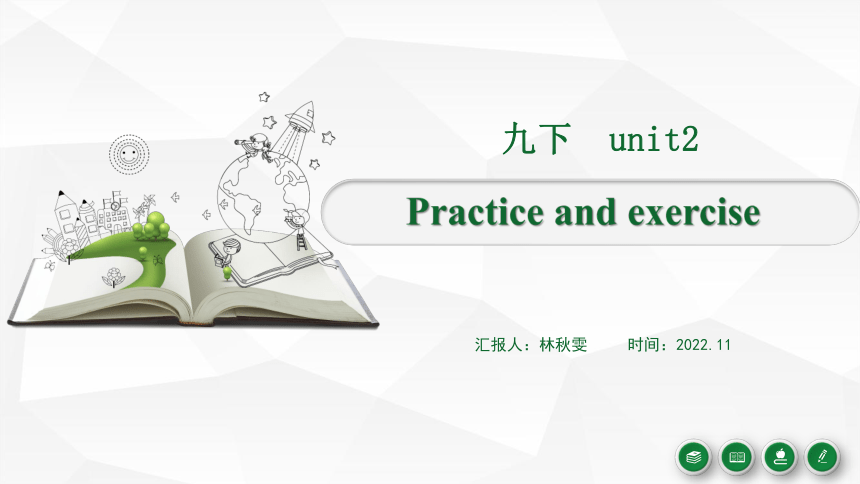 | |
| 格式 | zip | ||
| 文件大小 | 16.1MB | ||
| 资源类型 | 教案 | ||
| 版本资源 | 牛津深圳版 | ||
| 科目 | 英语 | ||
| 更新时间 | 2022-12-18 14:06:42 | ||
图片预览


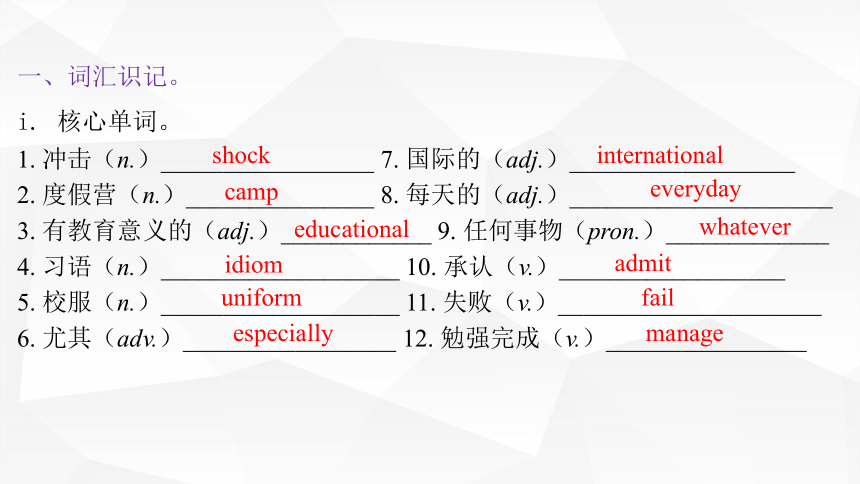
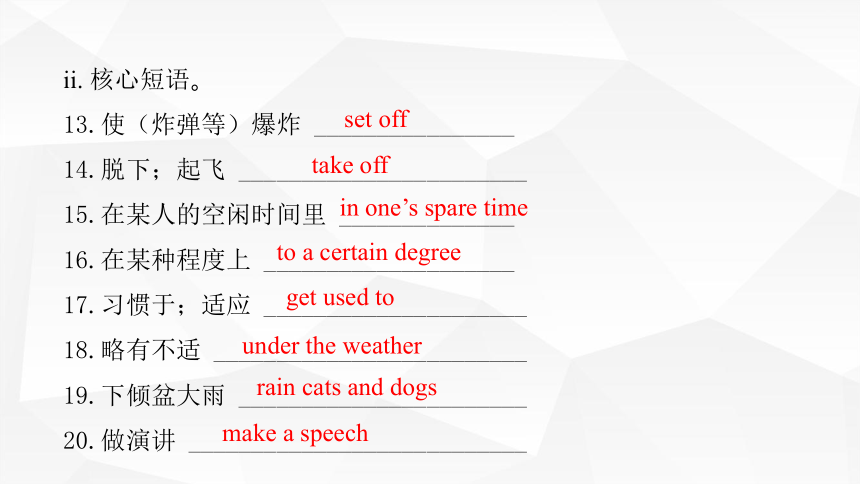
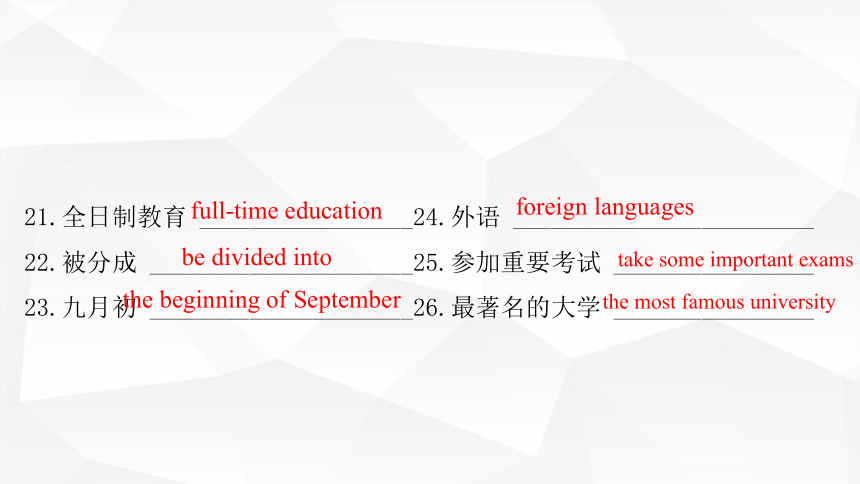

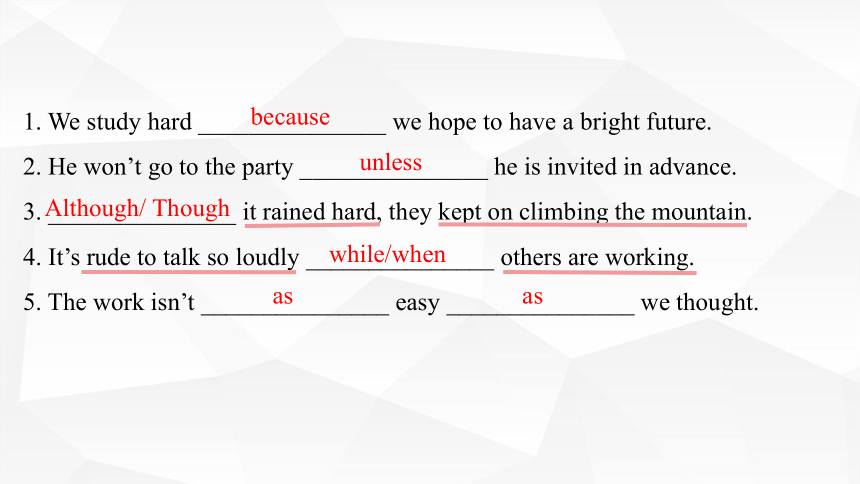
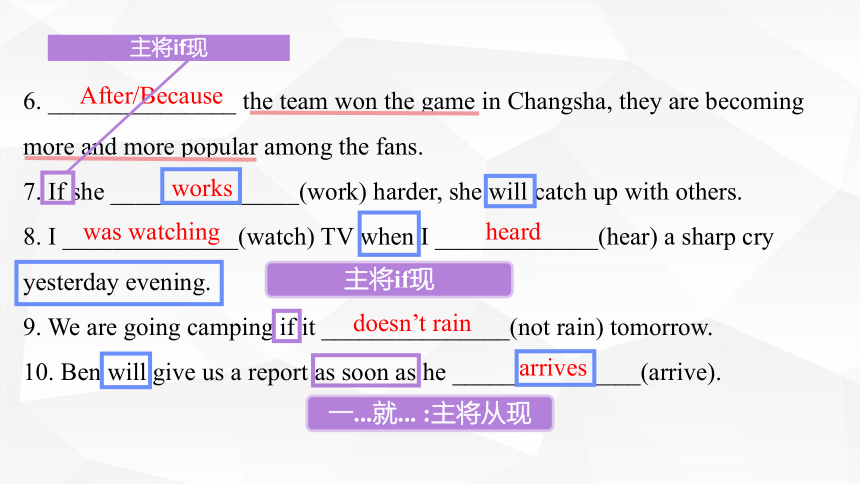
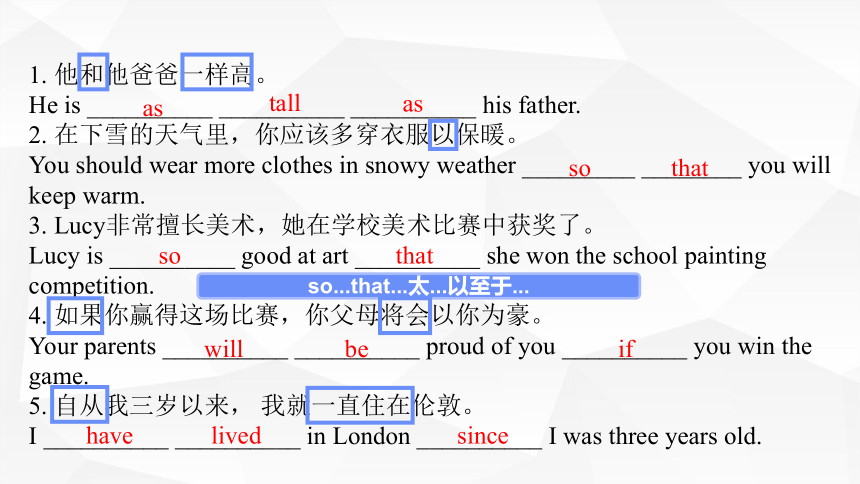

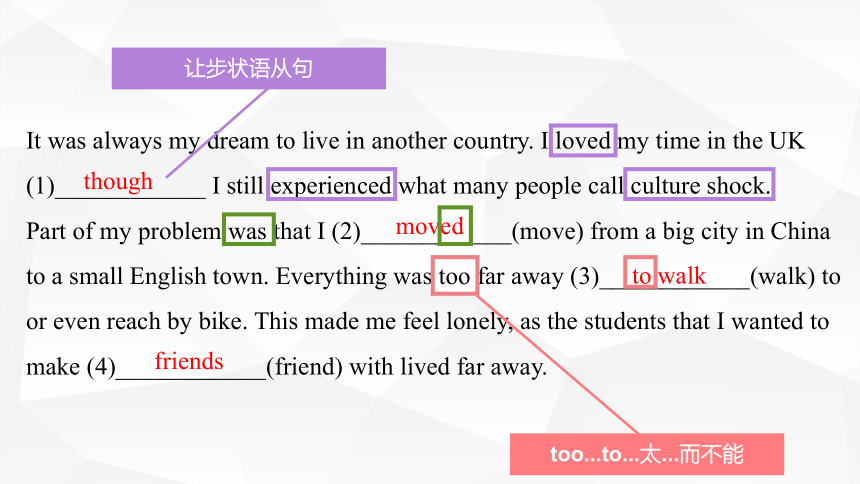
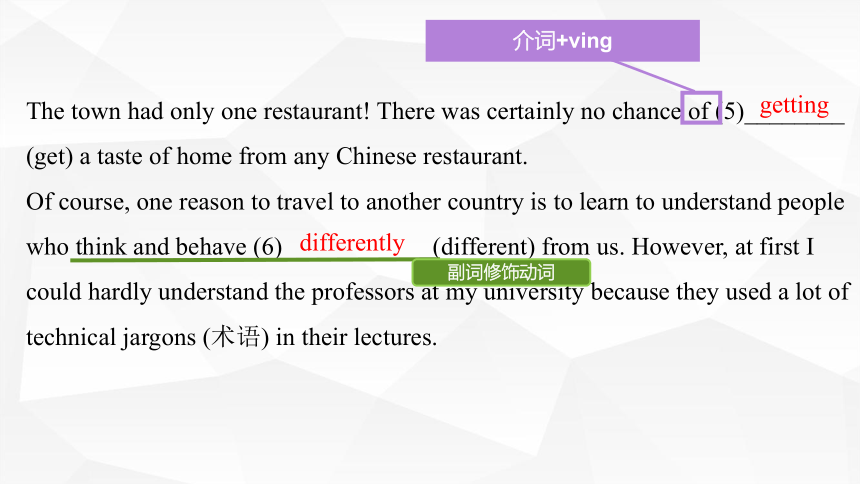
文档简介
(共48张PPT)
Practice and exercise
九下 unit2
汇报人:林秋雯
时间:2022.11
一. 词汇及短语复习
一、词汇识记。
核心单词。
1. 冲击(n.)_________________ 7. 国际的(adj.)__________________
2. 度假营(n.)_______________ 8. 每天的(adj.)_____________________
3. 有教育意义的(adj.)____________ 9. 任何事物(pron.)_____________
4. 习语(n.)___________________ 10. 承认(v.)__________________
5. 校服(n.)___________________ 11. 失败(v.)_____________________
6. 尤其(adv.)_________________ 12. 勉强完成(v.)________________
shock
camp
educational
idiom
uniform
especially
international
everyday
whatever
admit
fail
manage
ii. 核心短语。
13.使(炸弹等)爆炸 ________________
14.脱下;起飞 _______________________
15.在某人的空闲时间里 ______________
16.在某种程度上 ____________________
17.习惯于;适应 _____________________
18.略有不适 _________________________
19.下倾盆大雨 _______________________
20.做演讲 ___________________________
set off
take off
in one’s spare time
to a certain degree
get used to
under the weather
rain cats and dogs
make a speech
21.全日制教育 _________________24.外语 ________________________
22.被分成 _____________________25.参加重要考试 ________________
23.九月初 _____________________26.最著名的大学 ________________
full-time education
be divided into
the beginning of September
foreign languages
take some important exams
the most famous university
二. 语法知识点练习
1. We study hard _______________ we hope to have a bright future.
2. He won’t go to the party _______________ he is invited in advance.
3. _______________ it rained hard, they kept on climbing the mountain.
4. It’s rude to talk so loudly _______________ others are working.
5. The work isn’t _______________ easy _______________ we thought.
because
unless
Although/ Though
while/when
as
as
6. _______________ the team won the game in Changsha, they are becoming more and more popular among the fans.
7. If she _______________(work) harder, she will catch up with others.
8. I ______________(watch) TV when I _____________(hear) a sharp cry yesterday evening.
9. We are going camping if it _______________(not rain) tomorrow.
10. Ben will give us a report as soon as he _______________(arrive).
After/Because
works
主将if现
was watching
heard
doesn’t rain
主将if现
arrives
一...就... :主将从现
1. 他和他爸爸一样高。
He is __________ __________ __________ his father.
2. 在下雪的天气里,你应该多穿衣服以保暖。
You should wear more clothes in snowy weather _________ ________ you will keep warm.
3. Lucy非常擅长美术,她在学校美术比赛中获奖了。
Lucy is __________ good at art __________ she won the school painting competition.
4. 如果你赢得这场比赛,你父母将会以你为豪。
Your parents __________ __________ proud of you __________ you win the game.
5. 自从我三岁以来, 我就一直住在伦敦。
I __________ __________ in London __________ I was three years old.
as
tall
as
so
that
so
that
will
be
if
have
lived
since
so...that...太...以至于...
三. 篇章语法填空练习A
It was always my dream to live in another country. I loved my time in the UK (1)____________ I still experienced what many people call culture shock.
Part of my problem was that I (2)____________(move) from a big city in China to a small English town. Everything was too far away (3)____________(walk) to or even reach by bike. This made me feel lonely, as the students that I wanted to make (4)____________(friend) with lived far away.
though
moved
to walk
friends
too...to...太...而不能
让步状语从句
The town had only one restaurant! There was certainly no chance of (5)________ (get) a taste of home from any Chinese restaurant.
Of course, one reason to travel to another country is to learn to understand people who think and behave (6)____________(different) from us. However, at first I could hardly understand the professors at my university because they used a lot of technical jargons (术语) in their lectures.
getting
differently
介词+ving
副词修饰动词
I also had (7)____________(difficult) understanding the local people because they did not speak standard English. They spoke with (8)____________ accent (口音) and they used a lot of slang words (俚语) that were not in my dictionary! I even had trouble understanding my friends when they told jokes. To find a joke (9)____________(fun), you often have to understand a lot of background culture.
It has not been easy, but now I fit in. I can also say that I am not afraid (10)__________ anything!
difficulty
an
funny
of
have difficulty doing sth. 做某事有困难
find sth adj. 发现某物...
be afraid of 害怕
四. 篇章语法填空练习B
Dear Mum and Dad,
It is difficult (1)____________(believe) that I have already been at Shenzhen University for almost five months. During the first month I often missed home and family. I guess you could say that I had serious “homesickness”. Besides, this city was strange (2)________ me. I had to learn too many things.
But the longer I am here, the (3)________(much) I enjoy my life and studies. The Chinese people here are very (4)________(friend) to me and I have made quite a few friends already.
to believe
It is adj. to do sth.
to
be strange to sb 对某人而言是陌生的
more
the+比较级...the+比较级 越来越...
friendly
be+adj.
Even though I am very happy here, I still miss each of you often and thank a lot for (5)_________ you have done for me. How are you at home I hope you are both well. Now Dad smokes little so he can stay (6)_________(health).
I feel very (7)_________(excite) that in another week I shall (8)_________(be) with you again on holiday. I am leaving here early on Saturday, the 20th, and I shall arrive in Paris on Sunday morning.
what
healthy
stay+adj.
be
shall是情态动词+v.(原型)
excited
feel+adj.
五. 阅读理解练习 A
Forget about the“post-1995 generation”. Young people born between the mid-1990s and 2000s have another name in English—Generation Z. They grew up in a special period of time- a time in which technology developed fast, social changes happened every day, the Internet became universal.
This is a group of people who have known social media well as soon as they were born. “We are the first true digital natives (数字原住民). I can almost create a document (文档), edit it, post a photo on Instagram and talk on the phone, all at the same time,” said Hannah Payne, an 18-yearold student at UCLA, according to The New York Times. “Generation Z takes in information very fast and loses interest just as fast.”
( ) 1. A person who is called Generation Z_________.
A. grew up in the Internet era
B. created high technology
C. was born in 1990 or later
D. changed the society greatly
普遍的
A
时代,世纪
Forget about the“post-1995 generation”. Young people born between the mid-1990s and 2000s have another name in English—Generation Z. They grew up in a special period of time- a time in which technology developed fast, social changes happened every day, the Internet became universal.
This is a group of people who have known social media well as soon as they were born. “We are the first true digital natives (数字原住民). I can almost create a document (文档), edit it, post a photo on Instagram and talk on the phone, all at the same time,” said Hannah Payne, an 18-yearold student at UCLA, according to The New York Times. “Generation Z takes in information very fast and loses interest just as fast.”
( ) 2. What can we infer from paragraph 2
A. Gen Z-ers are proud of being the first true digital natives very much.
B. Gen Z-ers have no interest in the information they get from the Internet.
C. It’s impossible for Gen Z-ers to do more than one thing at the same time.
D. Social media has changed the way Gen Z-ers understand information.
D
吸收
Generation Z-ers are culture creators. “Growing up with the Internet has freed this generation from traditional cultural expression,” wrote Grace Masback, a Post blogger and a Generation Z-er herself. According to Masback, these young people no longer want to let their creativity be limited by their parents or traditional rules. They watch videos and read news online instead of on TV, and they share their experiences on social media. “We decide what kind of content we want to experience and choose how we experience it,” wrote Masback.
It is believed that Generation Z is the generation that is going to shape our future, which is why policy makers, sociologists and company leaders are trying their best to understand these young people.
( ) 3. According to Masback, why are Gen Z-ers culture creators
A. They have the courage to fight against traditional culture.
B. They enjoy sharing their own experiences on social media.
C. They get many different ideas from videos and news online.
D. Their parents give them more freedom to express themselves.
B
Generation Z-ers are culture creators. “Growing up with the Internet has freed this generation from traditional cultural expression,” wrote Grace Masback, a Post blogger and a Generation Z-er herself. According to Masback, these young people no longer want to let their creativity be limited by their parents or traditional rules. They watch videos and read news online instead of on TV, and they share their experiences on social media. “We decide what kind of content we want to experience and choose how we experience it,” wrote Masback.
It is believed that Generation Z is the generation that is going to shape our future, which is why policy makers, sociologists and company leaders are trying their best to understand these young people.
( ) 4. Which of the following best describes the author’s attitude towards Generation Z-ers
A. Confident. B. Wait-and-see. C. Sympathetic. D. Worried.
态度
观望
同情的
塑造
A
Generation Z-ers are culture creators. “Growing up with the Internet has freed this generation from traditional cultural expression,” wrote Grace Masback, a Post blogger and a Generation Z-er herself. According to Masback, these young people no longer want to let their creativity be limited by their parents or traditional rules. They watch videos and read news online instead of on TV, and they share their experiences on social media. “We decide what kind of content we want to experience and choose how we experience it,” wrote Masback.
It is believed that Generation Z is the generation that is going to shape our future, which is why policy makers, sociologists and company leaders are trying their best to understand these young people.
( ) 5. Where can we possibly read this article
A. In business newspapers. B. On science reports.
C. On culture magazines. D. On job advertisements.
C
六. 阅读理解B 练习
Almost all cultures celebrate the end of one year and the beginning of another in some way. Different cultures celebrate the beginning of a new year in different ways, and at different times on the calendar.
( ) 1. The reading is mainly about _____.
A. the meaning of “Happy New Year!” B. several different New Year traditions
C. what to eat on New Year’s Day D. why people dress up nicely on New Year’s Day
B
In Western countries, people usually celebrate New Year at midnight on December 31st to January 1st. People may go to parties, sometimes dressed in formal (正式的) clothes, and they may drink champagne at midnight. During the first minutes of the new year, people cheer and wish each other happiness for the year ahead. But some cultures prefer to celebrate the new year by waking up early to watch the sunrise. They welcome the new year with the first light of the sunrise.
Many cultures also do special things to get rid of bad luck at the beginning of a new year. For example, in Ecuador, families make a big doll from old clothes. The doll is filled with old newspapers and firecrackers. At midnight, these dolls are burned to show the bad things from the past year are gone and the new year can start afresh. Other common traditions to keep away bad luck in a new year include throwing things into rivers or the ocean, or saying special things on the first day of the new year.
( ) 2. It’s clear that _____.
A. some cultures celebrate New Year in the morning
B. the Western people celebrate New Year only on New Year’s Day
C. people in Ecuador go to parties on January 1st
D. no cultures do special things to celebrate New Year
A
Many cultures also do special things to get rid of bad luck at the beginning of a new year. For example, in Ecuador, families make a big doll from old clothes. The doll is filled with old newspapers and firecrackers. At midnight, these dolls are burned to show the bad things from the past year are gone and the new year can start afresh. Other common traditions to keep away bad luck in a new year include throwing things into rivers or the ocean, or saying special things on the first day of the new year.
( ) 3. In some cultures, people throw things into rivers or oceans to _____.
A. bring good luck B. keep away bad luck
C. forget everything D. plan for the next year
B
firecracker 爆竹
crack
破裂,发出破裂声
crack
饼干
In Western countries, people usually celebrate New Year at midnight on December 31st to January 1st. People may go to parties, sometimes dressed in formal (正式的) clothes, and they may drink champagne at midnight. During the first minutes of the new year, people cheer and wish each other happiness for the year ahead. But some cultures prefer to celebrate the new year by waking up early to watch the sunrise. They welcome the new year with the first light of the sunrise.
Many cultures also do special things to get rid of bad luck at the beginning of a new year. For example, in Ecuador, families make a big doll from old clothes. The doll is filled with old newspapers and firecrackers. At midnight, these dolls are burned to show the bad things from the past year are gone and the new year can start afresh. Other common traditions to keep away bad luck in a new year include throwing things into rivers or the ocean, or saying special things on the first day of the new year.
Other New Year traditions are followed to bring good luck in the new year. One widespread Spanish tradition for good luck is to eat grapes on New Year’s Day. The more grapes a person eats, the more good luck the person will have in the year. In France, people eat pancakes for good luck at New Year. In the United States, some people eat black-eyed peas for good luck―but to get good luck for a whole year you have to eat 365 of them!
( ) 4. To have a happy new year, _____.
A. friends talk to each other in special ways B. families make big dolls filled with old clothes
C. some people get up early to watch the sunrise D. Europeans eat 365 grapes on New Year’s Day
C
Other New Year traditions are followed to bring good luck in the new year. One widespread Spanish tradition for good luck is to eat grapes on New Year’s Day. The more grapes a person eats, the more good luck the person will have in the year. In France, people eat pancakes for good luck at New Year. In the United States, some people eat black-eyed peas for good luck―but to get good luck for a whole year you have to eat 365 of them!
( ) 5. When eating black-eyed peas on New Year’s Day, people think _____.
A. one pea brings one day of luck B. black-eyed peas are the best medicine
C. the peas are too black and taste bad D. the peas are helpful to count numbers
A
七. 阅读理解C 练习
五、阅读理解。
Dragons are not real animals, but they look like a combination (结合体) of many animals, such as snakes, fish, and deer. They have two horns and a long mustache (胡子). With fantastic power, they fly in the sky or swim in the sea. They can make rain, too. The Chinese dragon is a symbol of strength and good luck. The emperors of ancient China loved dragons. Their clothes were covered with pictures of dragons.
We are proud to call ourselves the “descendants (传人) of the dragons”. In China, “excellent” people are often called “dragons”. A number of Chinese sayings and idioms talk about dragons, for example, “Hoping one’s child will become a dragon”, which means hoping one’s child will be successful.
It is said that people born in the Year of the Dragon have certain characters. They are creative, confident, brave and quick- tempered. There are some famous “dragons” who have done excellent things. They are all successful.
There are also some traditional festivals in China, such as the Dragon Head-Raising Day and the Dragon Boat Festival. We have different kinds of activities to celebrate them. These two festivals come every year, but the year of the Dragon comes every twelve years.
The dragon is very important in Chinese culture. As the “descendants of the dragons”, it is necessary for us to know the views on dragons in our culture. It can help us understand why our parents always want us to be “dragons”.
后代,子孙
( ) 1. What does the Chinese dragon symbolize
A. A combination of many animals.
B. Chinese sayings and idioms.
C. Traditional festivals.
D. Strength and good luck.
( ) 2. In the passage, the underlined sentence “Hoping one’s child will become a dragon” means “________” in Chinese.
A. 龙马精神 B. 龙飞凤舞 C. 望子成龙 D. 龙腾虎跃
( ) 3. What characters may the people born in the Year of the Dragon have
A. They may be creative, confident, brave and powerful.
B. They may be creative, confident, brave and quick-tempered.
C. They may be lovely, confident, brave and quick-tempered.
D. They may be lucky, confident, creative and successful.
D
C
B
( ) 4. 1904 is the Year of the Dragon. Which of the following is the Year of the Dragon
A. 2012. B. 2016. C. 2017. D. 2018.
( ) 5. According to the passage, which of the following statements is TRUE
A. Dragons are real animals.
B. There are many Chinese sayings and idioms about dragons.
C. People born in the Year of the Dragon must be successful.
D. The “descendants of the dragons” are often called “dragons”.
A
B
八. 还原原文练习
A. Family life, too, was different.
B. But I have to say that I like it very much.
C. Here is a two-way student exchange in action.
D. School was quite different from what he had expected―much harder.
E. In fact, there are many differences between the two countries’ cultures.
F. At the same time, about 1,300 American teenagers will go to other countries.
This year 2,300 teenagers from all over the world will spend about ten months in US homes. They will attend US schools, meet US teenagers, and form impressions of America. 1 They will learn new languages and gain a new understanding of the rest of the world.
2 Fred, nineteen, spent last year in Germany with George’s family. In turn, George’s son Mike spent a year in Fred’s home in America.
Fred, a lively young man, knew little German when he arrived, but after two months’ study, the language began to come to him. 3 Students rose respectfully when the teacher entered the room. They took fourteen subjects instead of the six that are usual in the United States. There were almost no outside activities.
4 The father’s word was law, and all activities were around the family rather than one of the members. Fred found the food too simple at first. Also, he missed having a car.
形成印象
F
反过来
two-way :双向的
C
D
A
A. Family life, too, was different.
B. But I have to say that I like it very much.
C. Here is a two-way student exchange in action.
D. School was quite different from what he had expected―much harder.
E. In fact, there are many differences between the two countries’ cultures.
F. At the same time, about 1,300 American teenagers will go to other countries.
“Back home, you pick up some friends in a car and go out and have a good time. In Germany, you walk, but you soon learn to like it.” Meanwhile, in America, Mike, a German boy, was also forming his idea. “I suppose I should criticize (批评) American schools,” he said. “It is far too easy by our level. 5 In Germany we do nothing but study. Here we take part in many outside activities. I think that maybe your schools are better in training for citizens. There should be some middle ground between the two.”
B
妥协,中间地带
九. 信息匹配练习
A. In Spain, the New Year comes in more quietly. People get to the center of the city. Each holds a bag of grapes. As the clock strikes twelve, people eat the grapes―one for each strike.
B. The weather is changeable. Don’t be surprised to see Englishmen leave home on a bright, sunny morning with a raincoat or an umbrella.
C. Keep right! Horn-blowing is not allowed in most American cities, except when necessary.
D. Two kinds of TOEFL tests: One is the traditional written test, and the other is given on a computer. The best way to get ready for it is to use English and listen to English as much as possible.
E. You’d better arrive at your friend’s house on time or 5 minutes late. If you don’t know how to use the fork or knife, you can ask someone for help.
F. In Arab, there are strict rules for women. They don’t let people see their faces in public. Women can’t drive cars, either.
( ) 1. Tom is driving a car with his friends in America for the first time.
( ) 2. Li Fang is going to an American friend’s home for dinner. It’s new to her.
( ) 3. Miss Chen is going to have a trip in London. And she wants to know the weather of it to make sure what kind of clothes she should take.
( ) 4. Lin Tao has celebrated Chinese New Year’s Eve for many times. Now he wants to know how to celebrate New Year’s Eve in Spain.
( ) 5. Chen Fang is going to study in an American university and she wants to know something about TOEFL tests.
C
E
B
A
D
十. 作文 鉴赏
in the world
raft 乘坐筏子
convince sb that 使某人深信
1
2
3
build
grow
returned
Nothing is impossible
1
in the world
2
sailed
led
过着…的生活
live a…life
lead a…life
3
was
persistent 坚持不懈的
be unafraid of…不害怕…
hardship 困苦
同位语从句
protagonist 主角,主人公
encounter 遇到
on the voyage 在航行中
instead of..., sb...:某人没有...而是...
perseverance 毅力
mentor 导师
desperate 绝望的
make sb adj. 使某人...
painful 疼痛的
labour 劳动;劳工
as sb wishes,如某人所愿
regard 认为
attractive 吸引人的
result in 导致
extremely 极度地
what a/an +adj.+n+(主语+谓语)
make a decision to do sth. 下定决心做某事
form habit 养成好习惯
admire sb for sth 因某事而钦佩某人
(十分)awfully admire sb for sth 因某事而钦佩某人
be worth doing sth. 值得做某事
Thank you
汇报人:林秋雯
地点:903
Practice and exercise
九下 unit2
汇报人:林秋雯
时间:2022.11
一. 词汇及短语复习
一、词汇识记。
核心单词。
1. 冲击(n.)_________________ 7. 国际的(adj.)__________________
2. 度假营(n.)_______________ 8. 每天的(adj.)_____________________
3. 有教育意义的(adj.)____________ 9. 任何事物(pron.)_____________
4. 习语(n.)___________________ 10. 承认(v.)__________________
5. 校服(n.)___________________ 11. 失败(v.)_____________________
6. 尤其(adv.)_________________ 12. 勉强完成(v.)________________
shock
camp
educational
idiom
uniform
especially
international
everyday
whatever
admit
fail
manage
ii. 核心短语。
13.使(炸弹等)爆炸 ________________
14.脱下;起飞 _______________________
15.在某人的空闲时间里 ______________
16.在某种程度上 ____________________
17.习惯于;适应 _____________________
18.略有不适 _________________________
19.下倾盆大雨 _______________________
20.做演讲 ___________________________
set off
take off
in one’s spare time
to a certain degree
get used to
under the weather
rain cats and dogs
make a speech
21.全日制教育 _________________24.外语 ________________________
22.被分成 _____________________25.参加重要考试 ________________
23.九月初 _____________________26.最著名的大学 ________________
full-time education
be divided into
the beginning of September
foreign languages
take some important exams
the most famous university
二. 语法知识点练习
1. We study hard _______________ we hope to have a bright future.
2. He won’t go to the party _______________ he is invited in advance.
3. _______________ it rained hard, they kept on climbing the mountain.
4. It’s rude to talk so loudly _______________ others are working.
5. The work isn’t _______________ easy _______________ we thought.
because
unless
Although/ Though
while/when
as
as
6. _______________ the team won the game in Changsha, they are becoming more and more popular among the fans.
7. If she _______________(work) harder, she will catch up with others.
8. I ______________(watch) TV when I _____________(hear) a sharp cry yesterday evening.
9. We are going camping if it _______________(not rain) tomorrow.
10. Ben will give us a report as soon as he _______________(arrive).
After/Because
works
主将if现
was watching
heard
doesn’t rain
主将if现
arrives
一...就... :主将从现
1. 他和他爸爸一样高。
He is __________ __________ __________ his father.
2. 在下雪的天气里,你应该多穿衣服以保暖。
You should wear more clothes in snowy weather _________ ________ you will keep warm.
3. Lucy非常擅长美术,她在学校美术比赛中获奖了。
Lucy is __________ good at art __________ she won the school painting competition.
4. 如果你赢得这场比赛,你父母将会以你为豪。
Your parents __________ __________ proud of you __________ you win the game.
5. 自从我三岁以来, 我就一直住在伦敦。
I __________ __________ in London __________ I was three years old.
as
tall
as
so
that
so
that
will
be
if
have
lived
since
so...that...太...以至于...
三. 篇章语法填空练习A
It was always my dream to live in another country. I loved my time in the UK (1)____________ I still experienced what many people call culture shock.
Part of my problem was that I (2)____________(move) from a big city in China to a small English town. Everything was too far away (3)____________(walk) to or even reach by bike. This made me feel lonely, as the students that I wanted to make (4)____________(friend) with lived far away.
though
moved
to walk
friends
too...to...太...而不能
让步状语从句
The town had only one restaurant! There was certainly no chance of (5)________ (get) a taste of home from any Chinese restaurant.
Of course, one reason to travel to another country is to learn to understand people who think and behave (6)____________(different) from us. However, at first I could hardly understand the professors at my university because they used a lot of technical jargons (术语) in their lectures.
getting
differently
介词+ving
副词修饰动词
I also had (7)____________(difficult) understanding the local people because they did not speak standard English. They spoke with (8)____________ accent (口音) and they used a lot of slang words (俚语) that were not in my dictionary! I even had trouble understanding my friends when they told jokes. To find a joke (9)____________(fun), you often have to understand a lot of background culture.
It has not been easy, but now I fit in. I can also say that I am not afraid (10)__________ anything!
difficulty
an
funny
of
have difficulty doing sth. 做某事有困难
find sth adj. 发现某物...
be afraid of 害怕
四. 篇章语法填空练习B
Dear Mum and Dad,
It is difficult (1)____________(believe) that I have already been at Shenzhen University for almost five months. During the first month I often missed home and family. I guess you could say that I had serious “homesickness”. Besides, this city was strange (2)________ me. I had to learn too many things.
But the longer I am here, the (3)________(much) I enjoy my life and studies. The Chinese people here are very (4)________(friend) to me and I have made quite a few friends already.
to believe
It is adj. to do sth.
to
be strange to sb 对某人而言是陌生的
more
the+比较级...the+比较级 越来越...
friendly
be+adj.
Even though I am very happy here, I still miss each of you often and thank a lot for (5)_________ you have done for me. How are you at home I hope you are both well. Now Dad smokes little so he can stay (6)_________(health).
I feel very (7)_________(excite) that in another week I shall (8)_________(be) with you again on holiday. I am leaving here early on Saturday, the 20th, and I shall arrive in Paris on Sunday morning.
what
healthy
stay+adj.
be
shall是情态动词+v.(原型)
excited
feel+adj.
五. 阅读理解练习 A
Forget about the“post-1995 generation”. Young people born between the mid-1990s and 2000s have another name in English—Generation Z. They grew up in a special period of time- a time in which technology developed fast, social changes happened every day, the Internet became universal.
This is a group of people who have known social media well as soon as they were born. “We are the first true digital natives (数字原住民). I can almost create a document (文档), edit it, post a photo on Instagram and talk on the phone, all at the same time,” said Hannah Payne, an 18-yearold student at UCLA, according to The New York Times. “Generation Z takes in information very fast and loses interest just as fast.”
( ) 1. A person who is called Generation Z_________.
A. grew up in the Internet era
B. created high technology
C. was born in 1990 or later
D. changed the society greatly
普遍的
A
时代,世纪
Forget about the“post-1995 generation”. Young people born between the mid-1990s and 2000s have another name in English—Generation Z. They grew up in a special period of time- a time in which technology developed fast, social changes happened every day, the Internet became universal.
This is a group of people who have known social media well as soon as they were born. “We are the first true digital natives (数字原住民). I can almost create a document (文档), edit it, post a photo on Instagram and talk on the phone, all at the same time,” said Hannah Payne, an 18-yearold student at UCLA, according to The New York Times. “Generation Z takes in information very fast and loses interest just as fast.”
( ) 2. What can we infer from paragraph 2
A. Gen Z-ers are proud of being the first true digital natives very much.
B. Gen Z-ers have no interest in the information they get from the Internet.
C. It’s impossible for Gen Z-ers to do more than one thing at the same time.
D. Social media has changed the way Gen Z-ers understand information.
D
吸收
Generation Z-ers are culture creators. “Growing up with the Internet has freed this generation from traditional cultural expression,” wrote Grace Masback, a Post blogger and a Generation Z-er herself. According to Masback, these young people no longer want to let their creativity be limited by their parents or traditional rules. They watch videos and read news online instead of on TV, and they share their experiences on social media. “We decide what kind of content we want to experience and choose how we experience it,” wrote Masback.
It is believed that Generation Z is the generation that is going to shape our future, which is why policy makers, sociologists and company leaders are trying their best to understand these young people.
( ) 3. According to Masback, why are Gen Z-ers culture creators
A. They have the courage to fight against traditional culture.
B. They enjoy sharing their own experiences on social media.
C. They get many different ideas from videos and news online.
D. Their parents give them more freedom to express themselves.
B
Generation Z-ers are culture creators. “Growing up with the Internet has freed this generation from traditional cultural expression,” wrote Grace Masback, a Post blogger and a Generation Z-er herself. According to Masback, these young people no longer want to let their creativity be limited by their parents or traditional rules. They watch videos and read news online instead of on TV, and they share their experiences on social media. “We decide what kind of content we want to experience and choose how we experience it,” wrote Masback.
It is believed that Generation Z is the generation that is going to shape our future, which is why policy makers, sociologists and company leaders are trying their best to understand these young people.
( ) 4. Which of the following best describes the author’s attitude towards Generation Z-ers
A. Confident. B. Wait-and-see. C. Sympathetic. D. Worried.
态度
观望
同情的
塑造
A
Generation Z-ers are culture creators. “Growing up with the Internet has freed this generation from traditional cultural expression,” wrote Grace Masback, a Post blogger and a Generation Z-er herself. According to Masback, these young people no longer want to let their creativity be limited by their parents or traditional rules. They watch videos and read news online instead of on TV, and they share their experiences on social media. “We decide what kind of content we want to experience and choose how we experience it,” wrote Masback.
It is believed that Generation Z is the generation that is going to shape our future, which is why policy makers, sociologists and company leaders are trying their best to understand these young people.
( ) 5. Where can we possibly read this article
A. In business newspapers. B. On science reports.
C. On culture magazines. D. On job advertisements.
C
六. 阅读理解B 练习
Almost all cultures celebrate the end of one year and the beginning of another in some way. Different cultures celebrate the beginning of a new year in different ways, and at different times on the calendar.
( ) 1. The reading is mainly about _____.
A. the meaning of “Happy New Year!” B. several different New Year traditions
C. what to eat on New Year’s Day D. why people dress up nicely on New Year’s Day
B
In Western countries, people usually celebrate New Year at midnight on December 31st to January 1st. People may go to parties, sometimes dressed in formal (正式的) clothes, and they may drink champagne at midnight. During the first minutes of the new year, people cheer and wish each other happiness for the year ahead. But some cultures prefer to celebrate the new year by waking up early to watch the sunrise. They welcome the new year with the first light of the sunrise.
Many cultures also do special things to get rid of bad luck at the beginning of a new year. For example, in Ecuador, families make a big doll from old clothes. The doll is filled with old newspapers and firecrackers. At midnight, these dolls are burned to show the bad things from the past year are gone and the new year can start afresh. Other common traditions to keep away bad luck in a new year include throwing things into rivers or the ocean, or saying special things on the first day of the new year.
( ) 2. It’s clear that _____.
A. some cultures celebrate New Year in the morning
B. the Western people celebrate New Year only on New Year’s Day
C. people in Ecuador go to parties on January 1st
D. no cultures do special things to celebrate New Year
A
Many cultures also do special things to get rid of bad luck at the beginning of a new year. For example, in Ecuador, families make a big doll from old clothes. The doll is filled with old newspapers and firecrackers. At midnight, these dolls are burned to show the bad things from the past year are gone and the new year can start afresh. Other common traditions to keep away bad luck in a new year include throwing things into rivers or the ocean, or saying special things on the first day of the new year.
( ) 3. In some cultures, people throw things into rivers or oceans to _____.
A. bring good luck B. keep away bad luck
C. forget everything D. plan for the next year
B
firecracker 爆竹
crack
破裂,发出破裂声
crack
饼干
In Western countries, people usually celebrate New Year at midnight on December 31st to January 1st. People may go to parties, sometimes dressed in formal (正式的) clothes, and they may drink champagne at midnight. During the first minutes of the new year, people cheer and wish each other happiness for the year ahead. But some cultures prefer to celebrate the new year by waking up early to watch the sunrise. They welcome the new year with the first light of the sunrise.
Many cultures also do special things to get rid of bad luck at the beginning of a new year. For example, in Ecuador, families make a big doll from old clothes. The doll is filled with old newspapers and firecrackers. At midnight, these dolls are burned to show the bad things from the past year are gone and the new year can start afresh. Other common traditions to keep away bad luck in a new year include throwing things into rivers or the ocean, or saying special things on the first day of the new year.
Other New Year traditions are followed to bring good luck in the new year. One widespread Spanish tradition for good luck is to eat grapes on New Year’s Day. The more grapes a person eats, the more good luck the person will have in the year. In France, people eat pancakes for good luck at New Year. In the United States, some people eat black-eyed peas for good luck―but to get good luck for a whole year you have to eat 365 of them!
( ) 4. To have a happy new year, _____.
A. friends talk to each other in special ways B. families make big dolls filled with old clothes
C. some people get up early to watch the sunrise D. Europeans eat 365 grapes on New Year’s Day
C
Other New Year traditions are followed to bring good luck in the new year. One widespread Spanish tradition for good luck is to eat grapes on New Year’s Day. The more grapes a person eats, the more good luck the person will have in the year. In France, people eat pancakes for good luck at New Year. In the United States, some people eat black-eyed peas for good luck―but to get good luck for a whole year you have to eat 365 of them!
( ) 5. When eating black-eyed peas on New Year’s Day, people think _____.
A. one pea brings one day of luck B. black-eyed peas are the best medicine
C. the peas are too black and taste bad D. the peas are helpful to count numbers
A
七. 阅读理解C 练习
五、阅读理解。
Dragons are not real animals, but they look like a combination (结合体) of many animals, such as snakes, fish, and deer. They have two horns and a long mustache (胡子). With fantastic power, they fly in the sky or swim in the sea. They can make rain, too. The Chinese dragon is a symbol of strength and good luck. The emperors of ancient China loved dragons. Their clothes were covered with pictures of dragons.
We are proud to call ourselves the “descendants (传人) of the dragons”. In China, “excellent” people are often called “dragons”. A number of Chinese sayings and idioms talk about dragons, for example, “Hoping one’s child will become a dragon”, which means hoping one’s child will be successful.
It is said that people born in the Year of the Dragon have certain characters. They are creative, confident, brave and quick- tempered. There are some famous “dragons” who have done excellent things. They are all successful.
There are also some traditional festivals in China, such as the Dragon Head-Raising Day and the Dragon Boat Festival. We have different kinds of activities to celebrate them. These two festivals come every year, but the year of the Dragon comes every twelve years.
The dragon is very important in Chinese culture. As the “descendants of the dragons”, it is necessary for us to know the views on dragons in our culture. It can help us understand why our parents always want us to be “dragons”.
后代,子孙
( ) 1. What does the Chinese dragon symbolize
A. A combination of many animals.
B. Chinese sayings and idioms.
C. Traditional festivals.
D. Strength and good luck.
( ) 2. In the passage, the underlined sentence “Hoping one’s child will become a dragon” means “________” in Chinese.
A. 龙马精神 B. 龙飞凤舞 C. 望子成龙 D. 龙腾虎跃
( ) 3. What characters may the people born in the Year of the Dragon have
A. They may be creative, confident, brave and powerful.
B. They may be creative, confident, brave and quick-tempered.
C. They may be lovely, confident, brave and quick-tempered.
D. They may be lucky, confident, creative and successful.
D
C
B
( ) 4. 1904 is the Year of the Dragon. Which of the following is the Year of the Dragon
A. 2012. B. 2016. C. 2017. D. 2018.
( ) 5. According to the passage, which of the following statements is TRUE
A. Dragons are real animals.
B. There are many Chinese sayings and idioms about dragons.
C. People born in the Year of the Dragon must be successful.
D. The “descendants of the dragons” are often called “dragons”.
A
B
八. 还原原文练习
A. Family life, too, was different.
B. But I have to say that I like it very much.
C. Here is a two-way student exchange in action.
D. School was quite different from what he had expected―much harder.
E. In fact, there are many differences between the two countries’ cultures.
F. At the same time, about 1,300 American teenagers will go to other countries.
This year 2,300 teenagers from all over the world will spend about ten months in US homes. They will attend US schools, meet US teenagers, and form impressions of America. 1 They will learn new languages and gain a new understanding of the rest of the world.
2 Fred, nineteen, spent last year in Germany with George’s family. In turn, George’s son Mike spent a year in Fred’s home in America.
Fred, a lively young man, knew little German when he arrived, but after two months’ study, the language began to come to him. 3 Students rose respectfully when the teacher entered the room. They took fourteen subjects instead of the six that are usual in the United States. There were almost no outside activities.
4 The father’s word was law, and all activities were around the family rather than one of the members. Fred found the food too simple at first. Also, he missed having a car.
形成印象
F
反过来
two-way :双向的
C
D
A
A. Family life, too, was different.
B. But I have to say that I like it very much.
C. Here is a two-way student exchange in action.
D. School was quite different from what he had expected―much harder.
E. In fact, there are many differences between the two countries’ cultures.
F. At the same time, about 1,300 American teenagers will go to other countries.
“Back home, you pick up some friends in a car and go out and have a good time. In Germany, you walk, but you soon learn to like it.” Meanwhile, in America, Mike, a German boy, was also forming his idea. “I suppose I should criticize (批评) American schools,” he said. “It is far too easy by our level. 5 In Germany we do nothing but study. Here we take part in many outside activities. I think that maybe your schools are better in training for citizens. There should be some middle ground between the two.”
B
妥协,中间地带
九. 信息匹配练习
A. In Spain, the New Year comes in more quietly. People get to the center of the city. Each holds a bag of grapes. As the clock strikes twelve, people eat the grapes―one for each strike.
B. The weather is changeable. Don’t be surprised to see Englishmen leave home on a bright, sunny morning with a raincoat or an umbrella.
C. Keep right! Horn-blowing is not allowed in most American cities, except when necessary.
D. Two kinds of TOEFL tests: One is the traditional written test, and the other is given on a computer. The best way to get ready for it is to use English and listen to English as much as possible.
E. You’d better arrive at your friend’s house on time or 5 minutes late. If you don’t know how to use the fork or knife, you can ask someone for help.
F. In Arab, there are strict rules for women. They don’t let people see their faces in public. Women can’t drive cars, either.
( ) 1. Tom is driving a car with his friends in America for the first time.
( ) 2. Li Fang is going to an American friend’s home for dinner. It’s new to her.
( ) 3. Miss Chen is going to have a trip in London. And she wants to know the weather of it to make sure what kind of clothes she should take.
( ) 4. Lin Tao has celebrated Chinese New Year’s Eve for many times. Now he wants to know how to celebrate New Year’s Eve in Spain.
( ) 5. Chen Fang is going to study in an American university and she wants to know something about TOEFL tests.
C
E
B
A
D
十. 作文 鉴赏
in the world
raft 乘坐筏子
convince sb that 使某人深信
1
2
3
build
grow
returned
Nothing is impossible
1
in the world
2
sailed
led
过着…的生活
live a…life
lead a…life
3
was
persistent 坚持不懈的
be unafraid of…不害怕…
hardship 困苦
同位语从句
protagonist 主角,主人公
encounter 遇到
on the voyage 在航行中
instead of..., sb...:某人没有...而是...
perseverance 毅力
mentor 导师
desperate 绝望的
make sb adj. 使某人...
painful 疼痛的
labour 劳动;劳工
as sb wishes,如某人所愿
regard 认为
attractive 吸引人的
result in 导致
extremely 极度地
what a/an +adj.+n+(主语+谓语)
make a decision to do sth. 下定决心做某事
form habit 养成好习惯
admire sb for sth 因某事而钦佩某人
(十分)awfully admire sb for sth 因某事而钦佩某人
be worth doing sth. 值得做某事
Thank you
汇报人:林秋雯
地点:903
